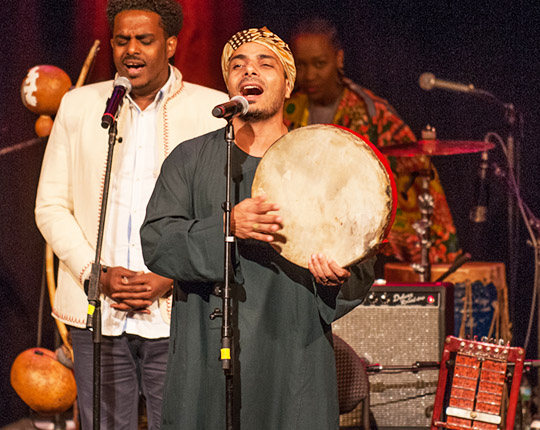Reviews April 20, 2017
The Nile Project: Live in Boston
The third U.S. tour by the shape-shifting, musical/environmental/activist phenomenon known as the Nile Project thrilled a packed house at the Somerville Theater in Boston on April 15. The concert, presented by World Music/CRASH Arts, came near the end of the tour, perhaps one reason that the 12 artists on stage seemed so joyously at ease and in synch. This is an ambitious act. The musical concept of the Nile Project is to bring together artists from divergent cultural backgrounds within the 11 countries that border the Nile River, and get them to collaborate. There are differences of language, custom, musical modes, rhythms, vocal ornamentation lexicons, on and on. And this musical challenge is a metaphor for the larger challenge of getting leaders and opinion makers in these 11 nations to collaborate on the future of the river itself.
[caption id="attachment_35974" align="aligncenter" width="609"]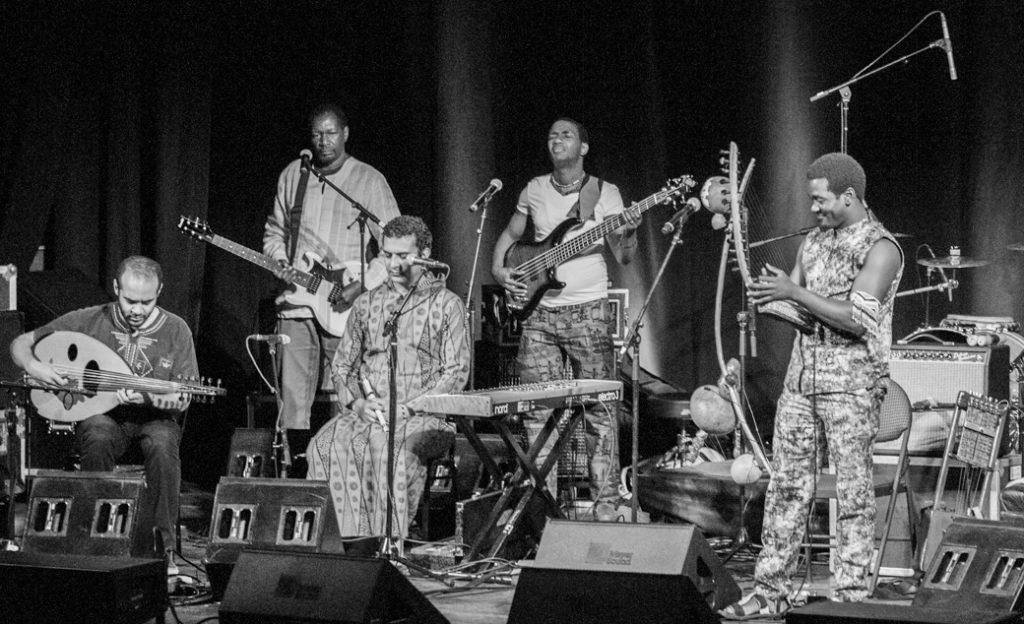 Nile Project, Sommerville Theater (Eyre 2017)[/caption]
Sticking with the music, six or so years of creating collaborative music have yielded a method that clearly works. This program consisted entirely of songs the artists co-composed during a 10-day retreat before the tour began. And the songs were excellent. This particular lineup benefited from the presence of a number of veterans. Egyptian oud and flute maestros Mohamed Abozekry and Nader El Shaer have emerged as tremendously versatile (as well as virtuoso) players, comfortable in the realms of Egyptian art music and Kenyan guitar benga boogie alike. Steven Sogo of Burundi also returned with characteristic humor and original take on roots idioms. Kenyan percussionist Kasiva Mutua assumed the role of MC for this tour, which she carried off in Boston with alacrity and charm.
Ethiopian vocalist Selamnesh Zemene, another veteran, is sensationally powerful, like a full-throttle blues belter when she lets loose. This time she was joined by three new vocalist participants, Asia Madani of Sudan, Ibrahim Fanous from Eritrea and, especially, Saleeb Fawzy from Egypt, a man with the power of the deepest, strongest Sufi trance singer and unrivaled nuance and technique. Saleeb electrified the crowd each time he approached the microphone.
[caption id="attachment_35967" align="aligncenter" width="601"]
Nile Project, Sommerville Theater (Eyre 2017)[/caption]
Sticking with the music, six or so years of creating collaborative music have yielded a method that clearly works. This program consisted entirely of songs the artists co-composed during a 10-day retreat before the tour began. And the songs were excellent. This particular lineup benefited from the presence of a number of veterans. Egyptian oud and flute maestros Mohamed Abozekry and Nader El Shaer have emerged as tremendously versatile (as well as virtuoso) players, comfortable in the realms of Egyptian art music and Kenyan guitar benga boogie alike. Steven Sogo of Burundi also returned with characteristic humor and original take on roots idioms. Kenyan percussionist Kasiva Mutua assumed the role of MC for this tour, which she carried off in Boston with alacrity and charm.
Ethiopian vocalist Selamnesh Zemene, another veteran, is sensationally powerful, like a full-throttle blues belter when she lets loose. This time she was joined by three new vocalist participants, Asia Madani of Sudan, Ibrahim Fanous from Eritrea and, especially, Saleeb Fawzy from Egypt, a man with the power of the deepest, strongest Sufi trance singer and unrivaled nuance and technique. Saleeb electrified the crowd each time he approached the microphone.
[caption id="attachment_35967" align="aligncenter" width="601"]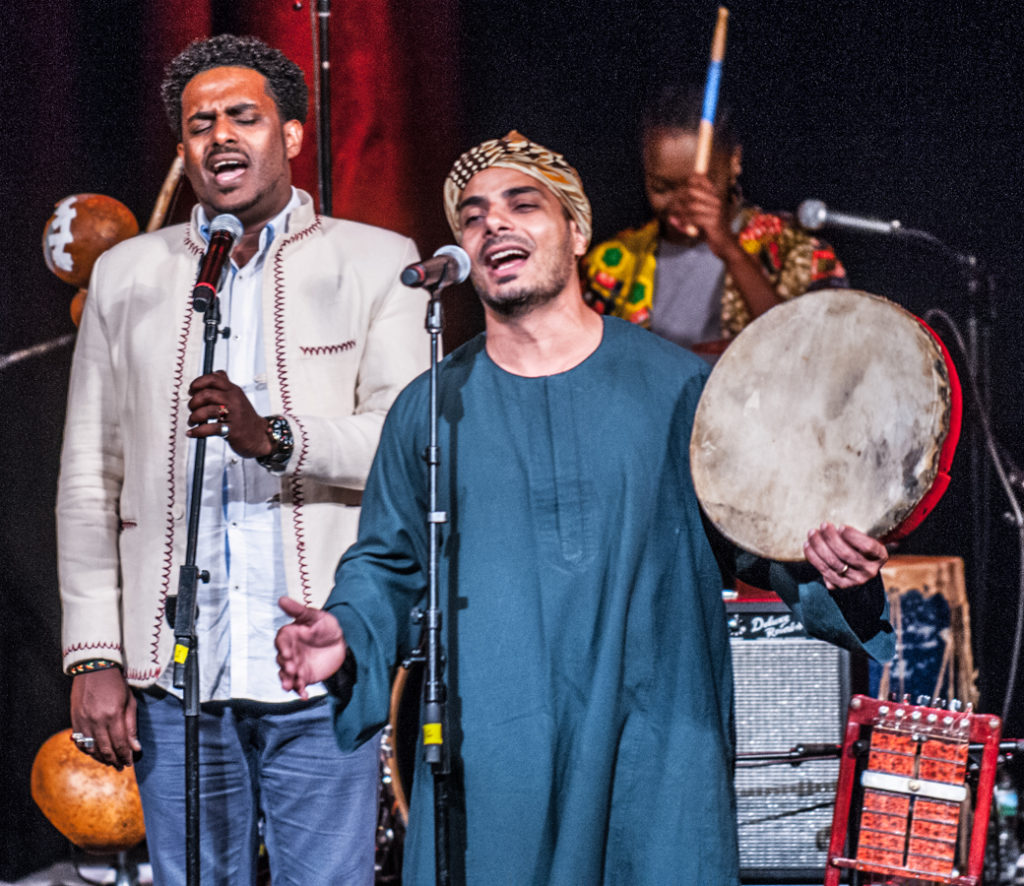 Ibrahim Fanous, Saleeb Fawzy[/caption]
Another noteworthy addition was Kenyan guitarist Dave Otieno, who created a kaleidoscope of colors on electric guitar throughout the night, but shone especially brightly on an old school benga number near the end of the second half.
What is most impressive here is the easy interaction and harmonizing between sonic textures: guitar and oud, oud and Eritrean krar, guitar with Ugandan adungu, Egyptian kawala flute and Burundian ikembe. And the percussionists, merging idioms from north and south, kept the grooves richly engaging all night. So many colors and textures came together in this performance, and with such ease. This is likely the most coherent, expansive and impressive presentation of East African music to ever reach an American stage.
[caption id="attachment_35978" align="aligncenter" width="600"]
Ibrahim Fanous, Saleeb Fawzy[/caption]
Another noteworthy addition was Kenyan guitarist Dave Otieno, who created a kaleidoscope of colors on electric guitar throughout the night, but shone especially brightly on an old school benga number near the end of the second half.
What is most impressive here is the easy interaction and harmonizing between sonic textures: guitar and oud, oud and Eritrean krar, guitar with Ugandan adungu, Egyptian kawala flute and Burundian ikembe. And the percussionists, merging idioms from north and south, kept the grooves richly engaging all night. So many colors and textures came together in this performance, and with such ease. This is likely the most coherent, expansive and impressive presentation of East African music to ever reach an American stage.
[caption id="attachment_35978" align="aligncenter" width="600"]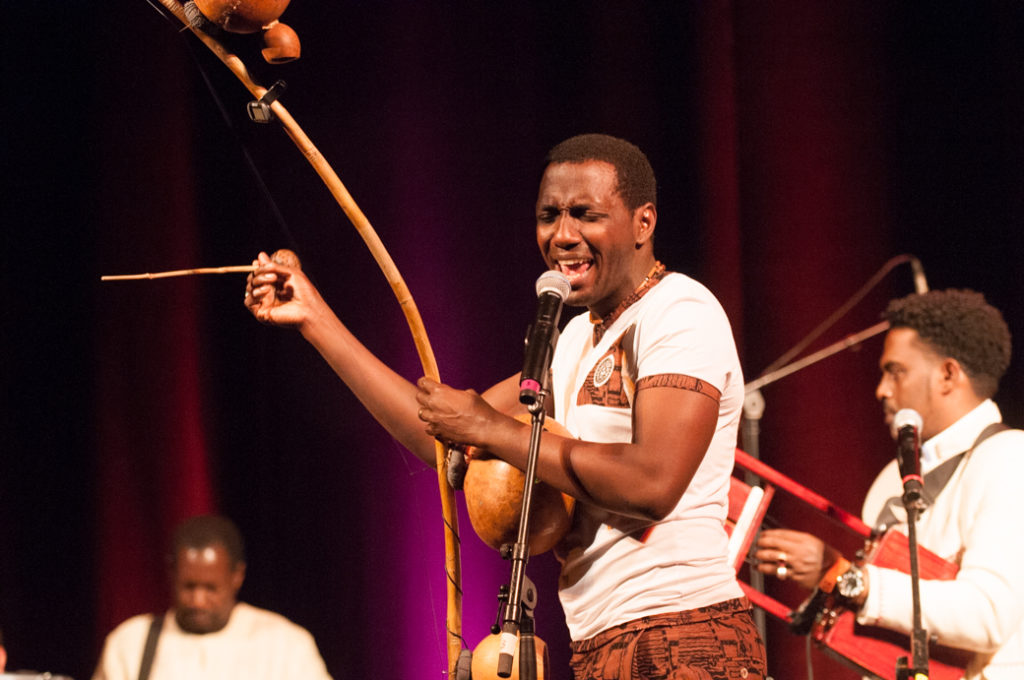 Steven Sogo[/caption]
[caption id="attachment_35976" align="aligncenter" width="601"]
Steven Sogo[/caption]
[caption id="attachment_35976" align="aligncenter" width="601"]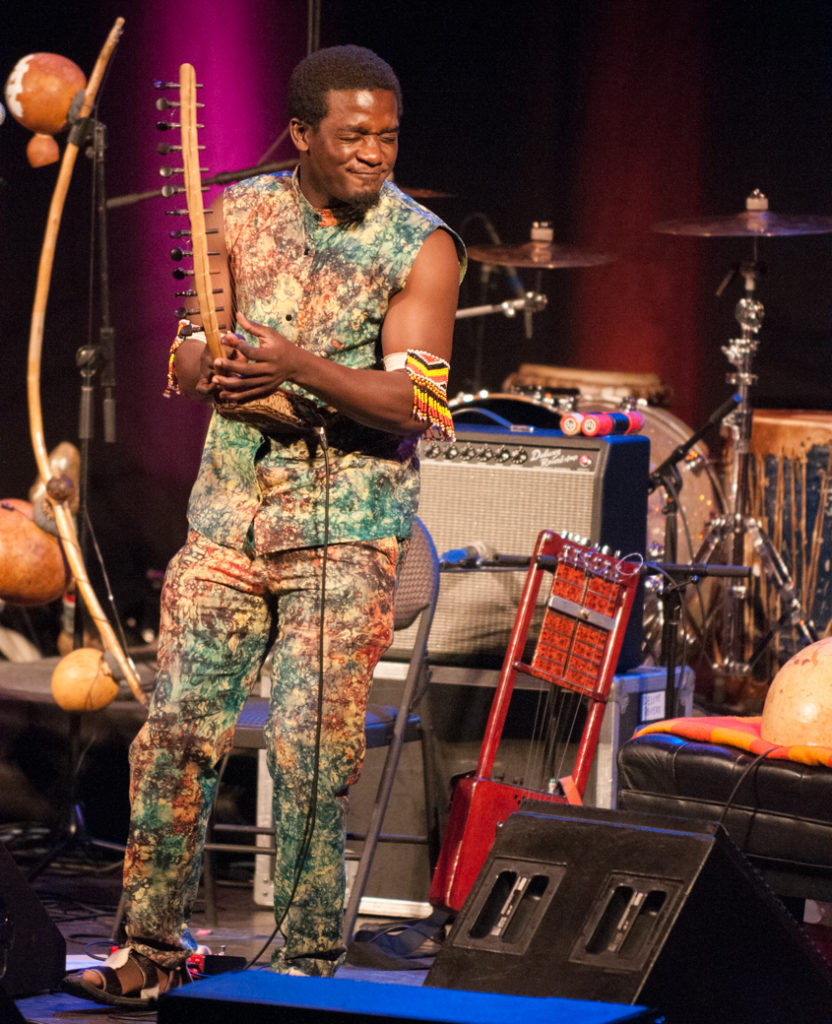 Michael Bazibu[/caption]
[caption id="attachment_35968" align="aligncenter" width="599"]
Michael Bazibu[/caption]
[caption id="attachment_35968" align="aligncenter" width="599"]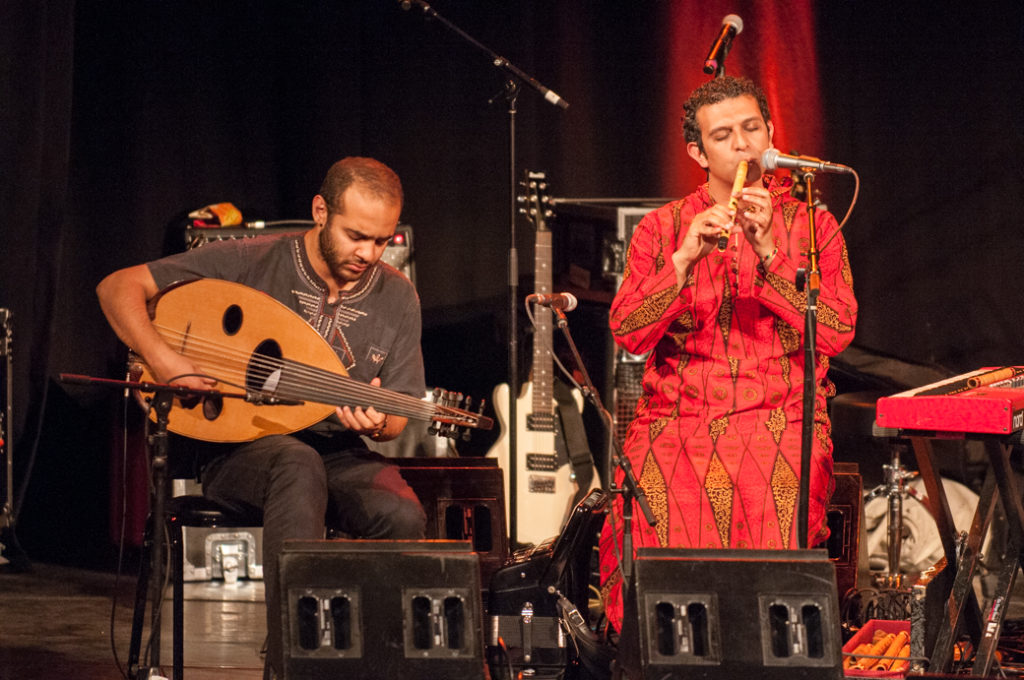 Mohamed Abozekry, Nader El Shaer[/caption]
[caption id="attachment_35970" align="aligncenter" width="601"]
Mohamed Abozekry, Nader El Shaer[/caption]
[caption id="attachment_35970" align="aligncenter" width="601"]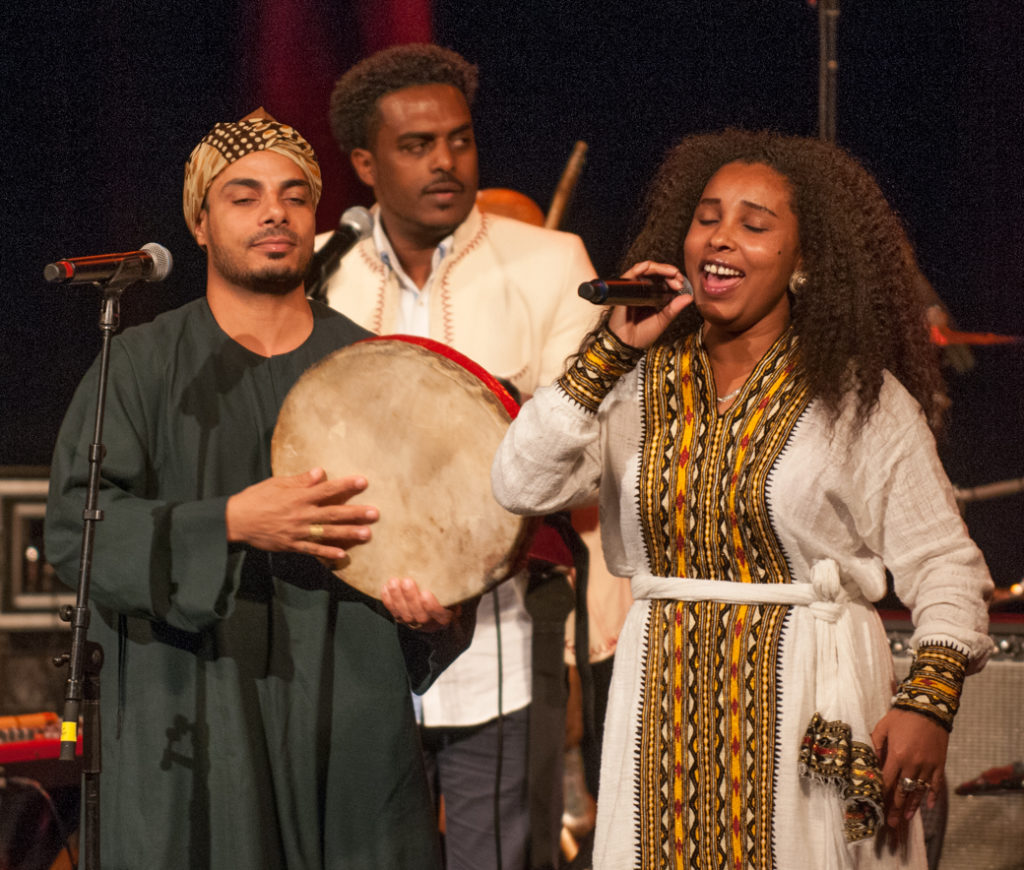 Saleeb, Ibrahim, Selamnesh Zemene[/caption]
[caption id="attachment_35979" align="aligncenter" width="601"]
Saleeb, Ibrahim, Selamnesh Zemene[/caption]
[caption id="attachment_35979" align="aligncenter" width="601"]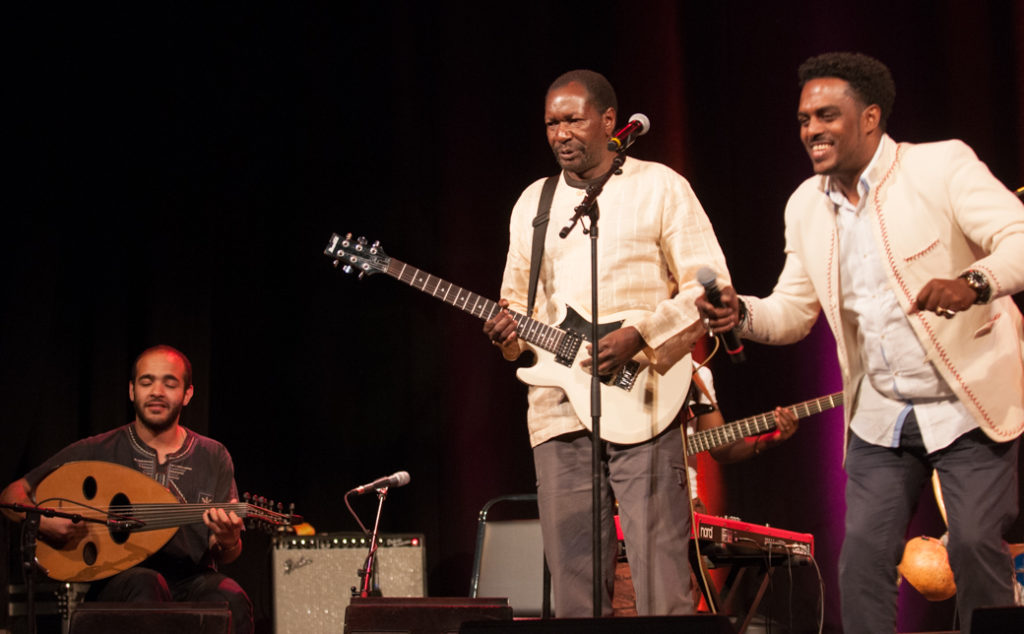 Dave Otieno[/caption]
Dave Otieno[/caption]
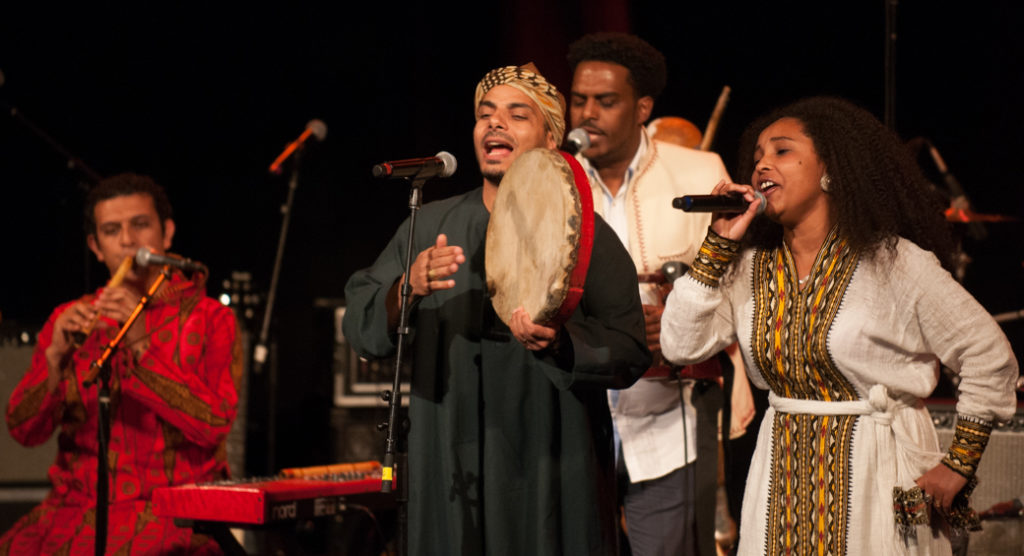

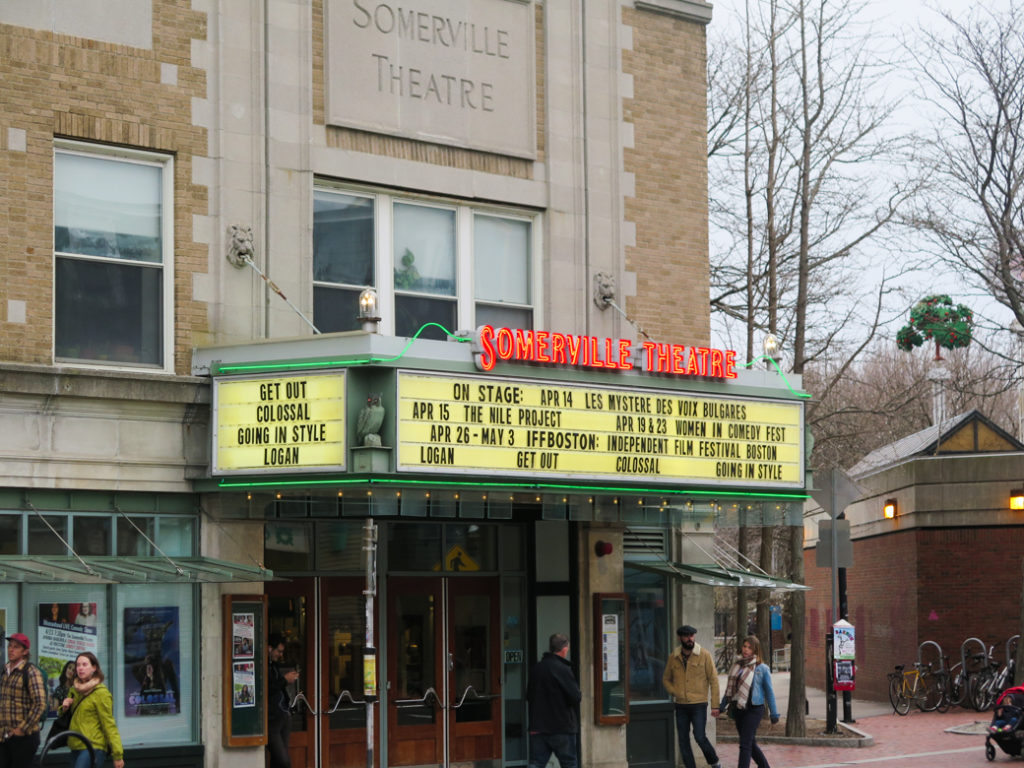 MORE ABOUT THE NILE PROJECT ON AFROPOP
MORE ABOUT THE NILE PROJECT ON AFROPOP
 Nile Project, Sommerville Theater (Eyre 2017)[/caption]
Sticking with the music, six or so years of creating collaborative music have yielded a method that clearly works. This program consisted entirely of songs the artists co-composed during a 10-day retreat before the tour began. And the songs were excellent. This particular lineup benefited from the presence of a number of veterans. Egyptian oud and flute maestros Mohamed Abozekry and Nader El Shaer have emerged as tremendously versatile (as well as virtuoso) players, comfortable in the realms of Egyptian art music and Kenyan guitar benga boogie alike. Steven Sogo of Burundi also returned with characteristic humor and original take on roots idioms. Kenyan percussionist Kasiva Mutua assumed the role of MC for this tour, which she carried off in Boston with alacrity and charm.
Ethiopian vocalist Selamnesh Zemene, another veteran, is sensationally powerful, like a full-throttle blues belter when she lets loose. This time she was joined by three new vocalist participants, Asia Madani of Sudan, Ibrahim Fanous from Eritrea and, especially, Saleeb Fawzy from Egypt, a man with the power of the deepest, strongest Sufi trance singer and unrivaled nuance and technique. Saleeb electrified the crowd each time he approached the microphone.
[caption id="attachment_35967" align="aligncenter" width="601"]
Nile Project, Sommerville Theater (Eyre 2017)[/caption]
Sticking with the music, six or so years of creating collaborative music have yielded a method that clearly works. This program consisted entirely of songs the artists co-composed during a 10-day retreat before the tour began. And the songs were excellent. This particular lineup benefited from the presence of a number of veterans. Egyptian oud and flute maestros Mohamed Abozekry and Nader El Shaer have emerged as tremendously versatile (as well as virtuoso) players, comfortable in the realms of Egyptian art music and Kenyan guitar benga boogie alike. Steven Sogo of Burundi also returned with characteristic humor and original take on roots idioms. Kenyan percussionist Kasiva Mutua assumed the role of MC for this tour, which she carried off in Boston with alacrity and charm.
Ethiopian vocalist Selamnesh Zemene, another veteran, is sensationally powerful, like a full-throttle blues belter when she lets loose. This time she was joined by three new vocalist participants, Asia Madani of Sudan, Ibrahim Fanous from Eritrea and, especially, Saleeb Fawzy from Egypt, a man with the power of the deepest, strongest Sufi trance singer and unrivaled nuance and technique. Saleeb electrified the crowd each time he approached the microphone.
[caption id="attachment_35967" align="aligncenter" width="601"] Ibrahim Fanous, Saleeb Fawzy[/caption]
Another noteworthy addition was Kenyan guitarist Dave Otieno, who created a kaleidoscope of colors on electric guitar throughout the night, but shone especially brightly on an old school benga number near the end of the second half.
What is most impressive here is the easy interaction and harmonizing between sonic textures: guitar and oud, oud and Eritrean krar, guitar with Ugandan adungu, Egyptian kawala flute and Burundian ikembe. And the percussionists, merging idioms from north and south, kept the grooves richly engaging all night. So many colors and textures came together in this performance, and with such ease. This is likely the most coherent, expansive and impressive presentation of East African music to ever reach an American stage.
[caption id="attachment_35978" align="aligncenter" width="600"]
Ibrahim Fanous, Saleeb Fawzy[/caption]
Another noteworthy addition was Kenyan guitarist Dave Otieno, who created a kaleidoscope of colors on electric guitar throughout the night, but shone especially brightly on an old school benga number near the end of the second half.
What is most impressive here is the easy interaction and harmonizing between sonic textures: guitar and oud, oud and Eritrean krar, guitar with Ugandan adungu, Egyptian kawala flute and Burundian ikembe. And the percussionists, merging idioms from north and south, kept the grooves richly engaging all night. So many colors and textures came together in this performance, and with such ease. This is likely the most coherent, expansive and impressive presentation of East African music to ever reach an American stage.
[caption id="attachment_35978" align="aligncenter" width="600"] Steven Sogo[/caption]
[caption id="attachment_35976" align="aligncenter" width="601"]
Steven Sogo[/caption]
[caption id="attachment_35976" align="aligncenter" width="601"] Michael Bazibu[/caption]
[caption id="attachment_35968" align="aligncenter" width="599"]
Michael Bazibu[/caption]
[caption id="attachment_35968" align="aligncenter" width="599"] Mohamed Abozekry, Nader El Shaer[/caption]
[caption id="attachment_35970" align="aligncenter" width="601"]
Mohamed Abozekry, Nader El Shaer[/caption]
[caption id="attachment_35970" align="aligncenter" width="601"] Saleeb, Ibrahim, Selamnesh Zemene[/caption]
[caption id="attachment_35979" align="aligncenter" width="601"]
Saleeb, Ibrahim, Selamnesh Zemene[/caption]
[caption id="attachment_35979" align="aligncenter" width="601"] Dave Otieno[/caption]
Dave Otieno[/caption]


 MORE ABOUT THE NILE PROJECT ON AFROPOP
MORE ABOUT THE NILE PROJECT ON AFROPOP







